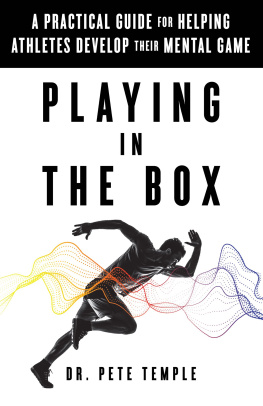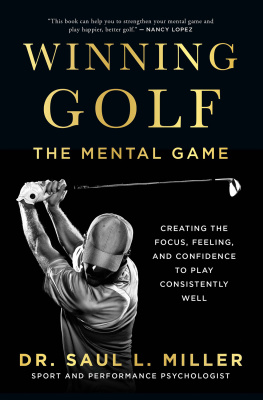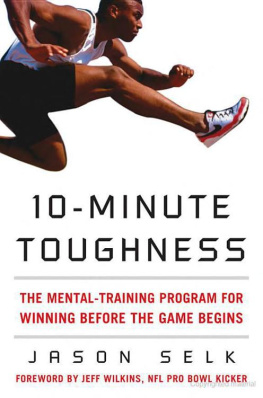The paper in this book meets the guidelines for permanence and durability of the Committee on Production Guidelines for Book Longevity of the Council on Library Resources.
The University of North Carolina Press has been a member of the Green Press Initiative since 2003.
1 Introduction
Are you a young athlete who wants to perform well in your sport? Do you want to learn mental skills to help you deal with pressure? Do you have dreams of playing at the highest level? Are you interested in getting the most out of yourself? Then this book is exactly right for you! I have designed it for any young person who is trying to be successful in any area of performance. It is specifically written for athletes, but it will also be beneficial to actors, spelling bee contestants, violinists, debaters, and dancers.
I was trained in exercise and sport science, and for the last fifteen years I have been conducting research, working with college athletes, and giving performance enhancement presentations to parents, coaches, and athletes. During this time I have realized that young athletes could benefit greatly from knowledge in the field of sport psychology, yet they are not being provided with this information in any kind of systematic fashion.
I know that young athletes are not getting this important sport psychology information because I see their behaviors at the fields, gyms, and courts. I see young athletes getting frustrated with their play and becoming so upset that they cannot perform. Is this you? I see teams of young athletes going into competition unprepared and losing to teams of lesser skill. Is this your team? And I see young athletes losing so much confidence in their ability and interest in their sport that they consider dropping out of their sport completely. Does this describe your experience? Also, I frequently meet adult athletes who tell me that they have never been exposed to the valuable mental skills that sport psychology offers skills that they could have been using for years to enhance their performance. Often adult athletes tell me that they have yearned for this kind of information and that they have had to seek it out themselves as they tried to master their mental skills. The thirst for knowledge apparent in these adult athletes and the stories they tell of their challenges as young athletes make it clear to me that sport psychology skills need to be provided to young athletes.

Do you have dreams of achieving a high level of success in some area of performance?
Not only do I believe that young athletes could benefit substantially from this sport psychology knowledge, but I think it is very likely that a young athlete will benefit even more from sport psychology techniques than will an adult athlete. Thus, the purpose of this book is to provide young athletes with an introduction to the mental skills they will need if they are to reach their potential in sport. Most sport psychology books that have been published are targeted toward older athletes; this book is written at a level that should be appropriate for junior high and high school students. That being said, adult athletes who have not had exposure to sport psychology techniques will also find this book helpful, and younger children who receive some help with the vocabulary could also benefit from this book. The concepts and skills introduced here can be used from childhood to adulthood; however, this book incorporates chapters that are specifically targeted toward young athletes and also includes some comments regarding developmentally appropriate activities for adolescents. I hope that the mental skills presented here will help young performers to harness their energies, focus their efforts, deal with pressure, and maximize their potential so that they can reach their goals. By reading this book, practicing the skills described, and committing yourself to the development of mental toughness, you will be making important strides toward accomplishing your goals in sport.
How to Use This Book
The chapters of this book are organized in a logical fashion; however, they may also be read independently of one another. So feel free to read the chapters in whatever order makes sense for you. If you have a few minutes, pick out any chapter and read through it! Many people need to read something more than once to really grasp the idea, so theres nothing wrong with reading the chapters a couple of times. As you read the information in a particular chapter, you might be referred to other chapters that provide additional related information to help you with a topic. Feel free to skip ahead to those chapters if youre interested in learning more about those ideas at that time. At the end of the mental toughness chapters, you are provided with exercises and worksheets to practice the skills discussed in the chapter. I encourage you to use the worksheets to help you improve your mental skills. After finishing a chapter, you should begin to incorporate its particular mental skill into your practices and competitions, and even into your free-time activities. By adding more and more of these skills to your mental toolbox, you will begin to develop the mental toughness that is necessary for you to reach your potential in your sport.
Although this book is particularly written for young athletes and is targeted toward sport performance, the information and techniques provided are just as useful for adult athletes and are relevant to any type of performance situation. Essentially, if you have a goal of bettering your performance in any activity, you can benefit from reading this book, adopting the mental skills as your own, and increasing your mental toughness.
EXAMPLES of sport situations that can benefit from mental toughness:
You have a goal of playing on your high school varsity team.
You want to improve your ability to perform in pressure situations.
You want to increase the consistency of your performance.
You have just been told that you will be starting in a big game.
You have just been told that you will not be starting in a big game.
You are having difficulty controlling your anger in games.
You have just had a season-ending injury.
You are having trouble maintaining your focus during a game.
EXAMPLES of non-sport situations that can benefit from mental toughness:
You are asked to give an oral presentation in front of your classmates.
You are experiencing test anxiety and cannot seem to perform well on examinations.
You are trying out for a part in a play.
You have a job interview.
You have a piano recital.
You are having trouble focusing during a dance routine.





